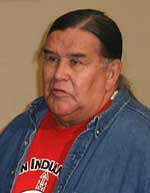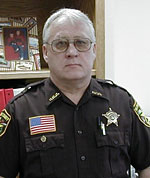Most people take for granted the right to pray, or worship as they choose. But for many years, Native Americans were denied that right. In 1890, as part of the U.S. government's assimilation policy, American Indian religious practices were outlawed. Eighty-eight years later, in 1978, Congress passed the American Indian Religious Freedom Act, restoring religious freedom to Indian people. But even now, some Indians—those in jail—are denied the opportunity to practice their religion.

|
Clyde Bellecourt, founder and Director of the American Indian Movement, participated in the decade-long effort to force Congress to pass the American Indian Religious Freedom Act, which was signed into law in 1978.
(MPR Photo/Kaomi Goetz)
|
CLYDE BELLECOURT HAS A BEAR-LIKE PHYSICAL PRESENCE.
His long salt-and-pepper hair is done in a traditional braid. His clothes reflect a pride in his Ojibwe heritage. He speaks slowly and thoughtfully. He says in the early 1950s and '60s, religious freedom was unknown for Indian people. In 1962, while he was serving time in Stillwater prision for burglary and armed robbery, the roots of change took hold.
"At that time I ran into a young spiritual leader - a medicine man - in prison, by the name of Eddie Benton Banai. We created one of the first culturally-based classes in America," says Bellecourt.
That was the beginning of an effort to force Congress to pass the American Indian Religious Freedom Act.
"It took 10 years to do, and a walk all the way from San Francisco to Washington D.C. in 1978 - called the Longest Walk - where we not only opposed 24 bills that were pending before Congress to terminate Indian people completely. But we also lobbied for the Indian Religious Freedom Act," says Bellecourt.
In September, 1978, President Jimmy Carter signed the bill into law. Bellecourt says things have improved in places like the Stillwater state prison, and in federal penitentiaries. But there are still problems.
Don Goodwin, or Yellow Cloud in the Anishinabe language, is a pipe carrier - a position similar to a deacon in the Christian faith. For the last 20 years, Goodwin has worked with county jails across Minnesota, performing ceremonies for American Indian prisoners. Many of these ceremonies involve the burning of sage, sweetgrass or cedar, and the smoking of a ceremonial pipe. To Native Americans, these are cleansing ceremonies, a chance to heal.
"The sage and sweetgrass and cedar do not do the healing, but provide for it. It brings the good spirits in and pushes the bad spirits out. I've seen it over and over again," says Goodwin.
Goodwin says in the past 20 years, he's seen county jail officials increasingly accept these ceremonies. But he says there is one county that won't let Indians practice religious customs in jail. Goodwin says Becker County, which includes part of the White Earth reservation, is the worst county in Minnesota for Indian prisioners who want to practice spiritual ceremonies. Goodwin says when he visited a prisoner at the jail he was detained, and claims he was strip-searched by county officials. He has not returned since.
An average four out of every 10 prisoners in the Becker County jail are American Indians. Ron Butcher, who's spiritual name is Three Eagles Standing, was an inmate there for four months. In February, he was transferred to the state prison near St. Cloud. Butcher says his requests to practice spiritual ceremonies at the Becker County jail were denied.
"I wanted to smoke a peace pipe and burn sage, and I wanted to sing on the drum because I sing on the drum myself," says Butcher.
 |
Rawley Oelfkey is chief corrections officer for Becker County. Oelfkey says he has tried to accomodate the spiritual needs of Indian prisoners, within the county's standard policies.
(MPR Photo/Bob Reha)
|
Butcher says because some ceremonies require the burning of tobacco or sage, jailers were concerned about the smuggling of contraband, like marijuana. He says Indian spiritual leaders like Goodwin are treated differently from ministers or priests.
"I asked a few people who came in there that did Bible study - stuff like that - if they ever got strip-searched, and they told me 'no,'" says Butcher.
Rawley Oelfkey is the Chief Corrections officer for Becker County. Oelfkey says Goodwin was subjected to a standard search, but not stripped.
"Because we didn't know who he was. We'd never met the man before, and the standard policy is that he and his possessions are searched when he comes in," says Oelfkey. "From what I understood he took offense to that, because he'd been going into jails all over the state of Minnesota. Sorry, that's our policy."
Oelfkey says since Don Goodwin will no longer come to the Becker County jail, he has tried to find other spiritual leaders to perform ceremonies for Indian prisoners. But none seem willing to work within the department's schedule.
"I spent an hour discussing the situtation with a guy from up north. After speaking with him for an hour, I told him our available program time is 8 p.m. He said 'I can't come and do it after dark.' I told him 'you just wasted an hour of my time. That's when our program time is,'" says Oelfkey.
Oelfkey says other efforts to start a program have also ended in failure. Part of the problem is numbers. There aren't many people among the tribes who know the spiritual ceremonies. But pipe carrier Don Goodwin says Becker County jail officials show a lack of understanding and respect for Indian people and their spiritual ceremonies.
"Thinking that they're pagan ways, or they don't mean anything to them. But to our people, it means a lot," says Goodwin.
Becker county officials say they're still searching for someone to come to the jail to conduct ceremonies.
Cylde Bellcourt says the ceremonies are important for Indian people, especially the young. He says establishing a spiritual base can help people change their lives. He says that happened to him 27 years ago, when he confronted his own battle with alcoholism.
"But I was unable to do that without a spiritual base. I was in and out of every treatment program you can think of - workhouses and jails and prison. That's where our young men and women find themselves today. And unless they can develop that spiritual base, we might as well forget about it," says Bellecourt.
Bellcourt says the "John Wayne mentality" is alive and well among non-Indians. Long-held stereotypes continue to portray Indians as less important, and their beliefs as strange. But for Clyde Bellcourt, a man who found a direction for his life in a prison cell, the biggest crime is denying young Indian people a chance to practice spiritual ceremonies in jail. It's a missed opportunity, he says, that could turn lives around. |